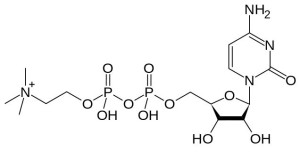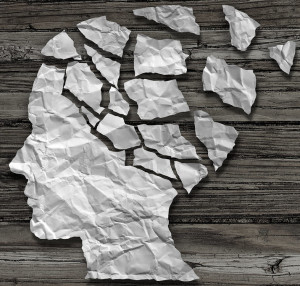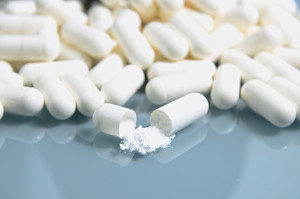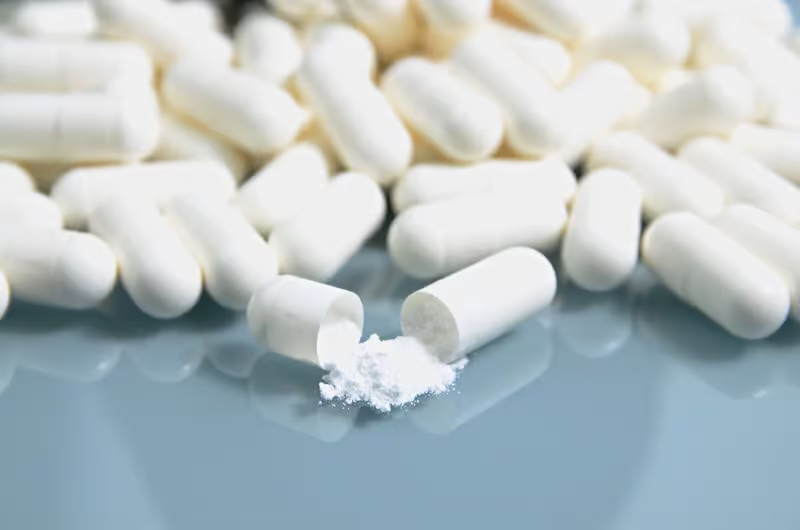Table of Contents
CDP-Choline (Cytidine Diphosphate Choline or cytidine 5′-diphosphocholine) is also known as Citicoline. This naturally occurring choline source is present in every cell in your body.
CDP-Choline is unique as a choline source. Once it’s digested it separates into cytidine and choline. When it gets to your brain it converts back to CDP-Choline.
This choline is needed to synthesize the neurotransmitter acetylcholine (ACh). ACh is a primary neurotransmitter released by neurons. This electrical signaling between neurons is involved in memory, learning, cognition and recall.
Cytidine is a component of Ribonucleic acid (RNA). This molecule is involved in coding, decoding, regulation and the expression of genes. But once it gets into the brain, it converts to uridine.
The signaling going on between neurons tends to grab choline molecules from cell membranes when choline is in short supply. This is where uridine steps in. It repairs those same cell membranes. To maintain neuron integrity.
CDP-Choline helps:
- Brain Optimization: CDP-Choline provides uridine once it enters in the brain. Uridine repairs, rebuilds and re-supplies the components needed for neuron repair. To keep signaling between neurons optimized for memory, learning, cognition and recall.
- Neurotransmitters: CDP-Choline enhances the release of norepinephrine, dopamine, serotonin, and acetylcholine in the brain.[i] [ii]
- Brain Energy: CDP-Choline increases Adenosine triphosphate (ATP) in brain cells. ATP is produced in your mitochondria and your main source of cellular energy.
Overview
CDP-Choline is a type of choline that is present in every cell in your body. You can also get it from eating organ meats like liver.

Choline is considered an essential nutrient because your body uses it faster than it can produce it. So you need to supplement choline either from food or a supplement.
You need choline for the production of the neurotransmitter acetylcholine. And to form phosphatidylcholine (PC), used in building cell membranes.
In fact, choline is so vital to cognition and nerve function that, without it, we couldn’t move, think, sleep or remember anything.
CDP-Choline has the unique ability to convert to cytidine and choline once it passes through your digestive system. After it crosses the blood-brain barrier, it converts back to CDP-Choline.
The left-over cytidine in your blood can convert into uridine in your brain. Uridine is necessary for repairing cell membranes.
CDP-Choline is involved in memory and cognitive functions. And provides energy for the brain to conduct sustained mental effort.
CDP-Choline vs. Alpha GPC vs. Choline Bitartrate: What’s the Difference?
Choline is a water-soluble nutrient similar in composition to B-vitamins. CDP-Choline, Alpha GPC, Choline Citrate and Choline Bitartrate are all sources of choline.
CDP-Choline (cytidine 5′-diphosphocholine): Is about 18% choline by weight and easily crosses the blood-brain barrier. Your body naturally synthesizes choline into CDP-Choline (Citicoline) in your brain.
Taken as a supplement, it’s then converted to cytidine and choline in your gut. Once it crosses the blood-brain barrier it’s converted back to CDP-Choline. The choline then assists cell membranes, and helps create acetylcholine.
 The added benefit of CDP-Choline is with cytidine. Cytidine can convert into uridine which is critical in the brain. Uridine is needed to synthesize the phosphatidylcholine (PC) in neuron membranes. It helps repair neurons.
The added benefit of CDP-Choline is with cytidine. Cytidine can convert into uridine which is critical in the brain. Uridine is needed to synthesize the phosphatidylcholine (PC) in neuron membranes. It helps repair neurons.
Choline Bitartrate: An economical form of choline, and about 40% choline by weight. So 1 gram of Choline Bitartrate offers 400 mg of actual choline. It does not easily cross the blood-brain barrier. So you won’t experience the same level of nootropic benefits as with Alpha GPC or CDP-Choline.
Alpha GPC: About 40% choline by weight and easily crosses the blood-brain barrier. Alpha GPC naturally occurs in your brain as a byproduct of phosphatidylcholine (PC). When your brain needs more choline, and the choline floating around in your brain is running low, it breaks down PC from cell membranes. And turns it into Alpha GPC.
Your body and brain loves it when you use Alpha GPC. Because it doesn’t have to cannibalize its own cells to get more choline.
How does CDP-Choline Work in the Brain?
CDP-Choline boosts brain health and function in several ways. But two in particular stand out.
- CDP-Choline is metabolized in the gut wall and liver to form choline and cytidine. Once choline and cytidine cross the blood-barrier they re-synthesize back into CDP-Choline (Citicoline).[iii]
In the brain choline aids in the synthesis of acetylcholine. And the release of dopamine.[iv] Acetylcholine is a neurotransmitter associated with memory and learning.
- CDP-Choline helps repair neural membranes. Choline is a precursor to the neurotransmitter acetylcholine (ACh) in your brain. ACh carries nerve impulses across synapses. And then is broken down by enzymes.
ACh is then reassembled for reuse. But this breakdown/reassembly process isn’t foolproof. Some ACh gets lost in the process. So your brain goes looking for more choline to make ACh.
If there isn’t enough choline in your blood, it gets it from the phosphatidylcholine (PC) that makes up the outside of the cell membrane of your neurons. The PC in the cell membrane releases choline to help make acetylcholine.
When your neurons lose too much choline, they lose integrity. Nerve impulses break down, and cognitive abilities decline.[v]
 Scientists in the lab at MIT showed that this is where uridine steps in. The cytidine in CDP-Choline converts to uridine in your body. And it works as a bridge between choline and neuron membrane synthesis.
Scientists in the lab at MIT showed that this is where uridine steps in. The cytidine in CDP-Choline converts to uridine in your body. And it works as a bridge between choline and neuron membrane synthesis.
Uridine is needed to synthesize the PC in neuron membranes. It is first converted to CDP-Choline. Which is then synthesized into new PC. This new PC can then repair damaged neuron membranes. Membranes that were raided to make acetylcholine.[vi]
How things go bad
As we get older, our brain chemistry and energy metabolism changes. This can happen at any age once we enter our adult years.
↓ Brain cell membranes degenerate
↓ Recall, reaction time and mood diminish
↓ Acetylcholine levels decline[vii]
All of these changes can happen at any age. And our bodies are influenced by the food we eat, what we drink, lifestyle habits, the air we breathe and more.
So CDP-Choline can help for age-related cognitive decline, as well as a student looking to do better in school. By boosting acetylcholine and dopamine. And rebuilding neurons in the brain.
CDP-Choline benefits
Research from hundreds of studies have shown that CDP-Choline will:
- Boost cognition[viii]
- Increase brain energy and speed up formation of brain membranes[ix]
- Boost production of acetylcholine[x]
- Increase blood flow in your brain[xi]
- Offset the harmful effects of stroke[xii]
- Improve memory and learning ability[xiii]
- Boost cognitive performance and memory in Alzheimer’s patients[xiv]
CDP-Choline is water-soluble and quickly enters your brain after you take it. In fact, studies show it has nearly 100% bioavailability in your body. Take it orally or intravenously and your body absorbs the same amount.
Once in your brain it boosts signal transmission, and repairs neurons. CDP-Choline improves your brain function and memory by directly increasing levels of acetylcholine and dopamine. And repairs neurons at the same time.
How does CDP-Choline feel?
The most profound indication of the power of this supplement is with those who have suffered a stroke.
Stroke survivors report that after continued usage of CDP-Choline, most of the noticeable effects of the stroke are gone. Including muscle paralysis and weakness.
 Neurohackers report they are better able to concentrate and focus. And experience a significant boost in cognition.
Neurohackers report they are better able to concentrate and focus. And experience a significant boost in cognition.
You can feel more mentally alert. And you may even ease the fatigue associated with clinical depression by using CDP-Choline.
Some use CDP-Choline as an alternative to the stimulants prescribed for ADHD.
CDP-Choline Clinical Research
In a study at the University of Utah, 75 healthy males were given 250 mg, 500 mg of CDP-Choline, or a placebo. Tests were recorded after 28 days of supplementation.
The adolescent males receiving 250 or 500 mg of CDP-Choline showed improved attention and psychomotor speed. And reduced impulsivity compared to adolescent males who received placebo.
This study indicates CDP-Choline is effective even in younger age groups. And can be particularly helpful to those dealing with ADHD.[xv]
CDP-Choline Enhances Cognition
A study published in Food and Nutrition Sciences assessed the potential cognitive-enhancing effects of Citicoline (CDP-Choline) in healthy, adult women.
This double-blind, randomized, placebo-controlled trial worked with 60 healthy women from 40 – 60 years old. Each volunteer was given a daily dose of 250 mg or 500 mg of Citicoline, or a placebo for 28 days.
The women who took either dose of Citicoline for 28 days showed a significant improvement in cognition.
The researchers suggested that Citicoline may improve attentional performance in middle-aged women. And it might eliminate the attention deficits associated with central nervous system disorders (i.e. ADHD).
CDP-Choline Improves Memory
Researchers in Japan studied 16 men and women who were given either 500 mg or 2000 mg of Citicoline for 6 weeks. Magnetic resonance spectroscopy (MRS) was used to study the brains of the participants at the end of the study.
The research team found ATP in the neurons of those in the study increased by over 14%. And membrane phospholipids were boosted by over 32%. These finding were in specific areas of the brain associated with cognition. And the effect was even more pronounced in the group that received the lower dose of Citicoline.
The researchers concluded that Citicoline supplementation could help prevent cognitive decline associated with aging. Along with an increase in brain energy reserves and utilization. And an increase in the components needed to synthesize and maintain cell membranes.
CDP-Choline Recommended Dosage
Recommended CDP-Choline dosage is 250 – 500 mg per day. Taken no more than twice per day. Two daily doses would be one CDP-Choline dose in the morning, and one in the early afternoon.
If you’re adding CPD-Choline to your stack with a racetam, a typical ratio would be 250 mg of Citicoline to 1 gram of Aniracetam or 4 grams of Piracetam.
CDP-Choline Side Effects
Recommended dosages even for extended periods are considered well-tolerated and safe. While CDP-Choline is considered non-toxic, it is possible to experience toxicity with too much choline in your body.
If you experience trouble sleeping, headache, diarrhea, low or high blood pressure, nausea, blurred vision or chest pain – you should stop using CDP-Choline.
Type of CDP-Choline to Buy
 CDP-Choline is sold in capsule and powder form. Capsules are usually 250 – 500 mg each. 500 mg of CDP-Choline in powder form is equivalent to 2-level 1/8 tsp scoops.
CDP-Choline is sold in capsule and powder form. Capsules are usually 250 – 500 mg each. 500 mg of CDP-Choline in powder form is equivalent to 2-level 1/8 tsp scoops.
Cognizin® is a patented, allergen-free, and water-soluble form of CDP-Choline shown in clinical trials to boost brain cell membrane formation by 26%. And increase brain energy by 13.6%.[xvi]
CDP-Choline is often found in pre-formulated nootropic stacks. But as Cognizin® is only offered in premium stacks.
You get an effective 250 mg Citicoline in Click for Mind Lab Pro® including effective doses of 10 brain enhancing nootropic compounds.
I recommend Mind Lab Pro® because it addresses all aspects of anxiety, memory and cognitive enhancement, stabilizes mood, brain repair, and maintenance. See my full Mind Lab Pro review for more.
Nootropics Expert Recommendation
I recommend using CDP-Choline as a nootropic supplement.
CDP-Choline is brain food. And is a natural substance found in every cell in your body.
You can get choline from some of the food you eat. But adequate levels of CDP-Choline are only found in organ meats like liver. So to get its benefits you must take it as a supplement.
CDP-Choline is vital to maintaining optimal brain health. And has been shown to increase cognitive energy, boost brain function, enhance communication between neurons, and protect neural membranes from free radical damage.
You get an effective 250 mg Citicoline in Click for Mind Lab Pro® including effective doses of another 10 brain enhancing nootropic compounds..
I suggest supplementing 250 – 300 mg twice per day. And CDP-Choline is a great compliment to a stack including any nootropic from the racetam-family. Anything that causes an increase in uptake of acetylcholine in your brain.
You need to provide your brain with the CDP-Choline it is demanding. Or it starts cannibalizing your own brain cells to make more acetylcholine. Signs that you’re lacking adequate choline are headaches.
When using CDP-Choline with one of the racetams start with a ratio of 1:4. For example, 250 mg of CDP-Choline to 1,000 mg of Aniracetam.
Stroke survivors may want to up the dose to 2,000 mg per day.
I use and recommend Click for Mind Lab Pro® which includes effective doses of 11 brain enhancing nootropic compounds including 250 mg of Citicoline.










Join The Discussion - 297 comments
John
August 16, 2019
Hey there. I know there are studies showing use of CDP choline can increase cortisol by stimulating ACTH. Do you worry about this at all?
David Tomen
August 16, 2019
John, I looked but cannot find any reference showing CDP-Choline increases cortisol. If you can point me to some evidence of this I’m happy to take a look and offer you an opinion.
John
August 1, 2019
Hi David,
I have poor short term memory and lack of focus/concentration. I am thinking of trying CDP Choline or Alpha GPC. Which would you recommend ?
I also take half of a .5 mg xanax a few times per week to help with anxiety and it helps my sleep. Is it ok to take xanax with CPD Choline or Alpha GPC ?
Any information would be greatly appreciated.
Thank you
David Tomen
August 2, 2019
John, as long as you are using Xanax, memory, focus and concentration are going to be a challenge. You can hopefully mitigate some of these side effects by using the suggestions in this post: https://nootropicsexpert.com/how-to-improve-memory-and-concentration/
There are no contraindications with Xanax and choline supplements. But you’ll need to try Alpha GPC for a couple of weeks and then CDP-Choline for a couple of weeks and see which one works best for you.
Christian
July 2, 2019
I always enjoy getting the emails and it often leads me down a rabbit hole of investigation. So thank you for that….really…it’s a good thing.
I just got a recent email regarding a study done in Japan on mice using Citicoline and DHA and was very interested in finding out more but when I looked at the study they used 40mg/kg of Citicoline and 300mg/kg of DHA.
I could be wrong but if I calculate for 160lb human at those numbers it would be 2,880mg of Citicoline and 21,600mg of DHA.
Isn’t that a HUGE amount? Most Citicoline I have seen is about 250mg per capsule which would be almost 12 capsules. I have a calamari oil product that has 500mg of DHA so that would be about 43 capsules….I think I would be glued to the toilet if I took that much 🙂
Maybe I missed something.
David Tomen
July 4, 2019
Christian, you are absolutely correct on dosages and I should have mentioned that in the email. Ideal dosage for DHA is 1,000 mg per day. And CDP-Choline is whatever you need. From 250 – 500 mg per day. Some even go as high as 750 mg per day.
Neil Rowland
July 26, 2019
Hi, can you mix CDP Choline with Uridine supplements?
David Tomen
July 27, 2019
Neil, I suppose you could combine them. But as a nootropic,CDP-Choline provides uridine once it enters in the brain. So not sure why you’d want or need more Uridine.
Andria Hay
June 14, 2019
I am new to nootropics. My thiamine level was 10 so I want to supplement with Sulbutiamine and Citicoline. Not only to raise my thiamine level but for memory, severe fatigue, anxiety etc. I am diagnosed dysautonomia/pots and hypermobility syndrome. I’ve read about the acetylcholine receptors invoked in these illnesses. I am only trying to start one at a time and add after a couple of days so I know if I react badly to anything. Are these two good together as a start? It’s hard to find a lot of research and I want to use more supplements than prescriptions. Hoping you can shed some light in this for me. You have a lot of good info!!!!
David Tomen
June 15, 2019
Andria, it’s good to start slow if you don’t know how your body will react. But Citicoline and Sulbutiamine work well together. Thiamine is required for the synthesis of acetylcholine and Citicoline provides the raw material for making acetylcholine. Good choice. But you also need some of the other B-Vitamins for the synthesis of acetylcholine. I’d consider adding a high quality B-Complex vitamin like this one: https://amzn.to/2XjeyAt
Jay LIM
May 12, 2019
Dear David.
Thanks so much for your articles about Choline!
I’m fighting depression and some ocd. Between CDP-Choline and Alpha GPC , which is better to try first? I want to try one by one because they are expensive. I’d like to hear your opinion.
David Tomen
May 12, 2019
Jay, one is not better than the other. But some people respond better to CDP-Choline and some respond better to Alpha GPC.
Please re-read this section of this review: https://nootropicsexpert.com/cdp-choline/#cdp-choline-vs-alpha-gpc-vs-choline-bitartrate-whats-the-difference. And learn how each works in your brain.
Then if you can only afford one, choose one or the other and try it. If it doesn’t help then try the other.
Alina
March 10, 2019
Hello, I was curious to know if I should take this with food or in between meals? I have 300 mg supplements and the directions do not say. Thanks !
David Tomen
March 10, 2019
Alina, CDP-Choline can be taken with or without food.
Cheryl
February 21, 2019
Hi David,
I am taking an antipsychotic (quetaipine) for bipolar. I understand it is an anticholigernic. Will taking a choline supplement offset these affects?
Also, I am pregnant and understand the importance of choline for the fetus. Does taking an antipsychotic deplete my choline stores in my body. Will the baby be able to absorb the choline from a supplement even though I am taking an anticholrgenic?
David Tomen
February 21, 2019
Cheryl, Quetiapine is much more than an anticholinergic. Please see this Wikipedia article so you have a better understanding on what you are dealing with: https://en.wikipedia.org/wiki/Quetiapine#Pharmacology.
A choline supplement will not “offset” the effects of an anticholinergic. But it will provide more choline (which is needed for the synthesis of acetylcholine). And combined with a potent drug like Quetiapine could result in too much acetylcholine. Which is dangerous for your and your baby.
This drug also affects dopamine, serotonin and histamine. Which means it is contraindicated with most of the nootropics reviewed here on Nootropics Expert.
Combining nootropic supplements with many prescription drugs can be very dangerous. And in some cases deadly. So please be careful. I’ve tried to include contraindications under the “Side Effects” section of each review on this site. But I can’t cover all of them. Another good resource for contraindications is here: https://www.drugs.com/drug_interactions.html
Cheryl
February 21, 2019
Thank you. I will take this seriously and talk to my doctors before (potentially) starting any supplements and/or changing meds.
Do you know of any risks of taking choline supplements with lamotrigine?)
David Tomen
February 21, 2019
Cheryl, lamotrigine doesn’t seem to have any or much effect on acetylcholine in your brain: https://en.wikipedia.org/wiki/Lamotrigine#Pharmacology
And unless your doctor is a well educated integrative medicine doctor, Osteopath or naturopathic physician, chances are he/she won’t know what you are talking about. Or will give you some kind of blanket statement that dietary supplements don’t work and are not tested.
It’s why I encourage everyone coming to Nootropics Expert to learn how to do your own research. And learn exactly how the prescription medications that they use work in their body and brain.
Naveen
February 7, 2019
Hi David,
Thank you for providing all information about this field. I am taking CDP Coline 300mg. What is the best time to take this. Is it better to have the capsules with food or an empty stomach?
Thank you
David Tomen
February 8, 2019
Naveen, you can take CDP-Choline first thing in the morning and/or early afternoon. With or without food.
Naveen
February 8, 2019
Thanks for the reply David.